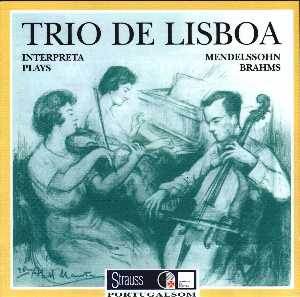Felix MENDELSSOHN (1809 - 1847) Trio No 1 in D
Minor. Op. 49 (not E Minor as shown on CD)
29'44"
Johannes BRAHMS (1833 - 1897) Trio No 2 in C
Major. Op. 87
29'24"
 Trio de Lisboa Leonor
de Sousa Prado (violin), Pedro Corostola (cello), Nella Maissa (piano)
Trio de Lisboa Leonor
de Sousa Prado (violin), Pedro Corostola (cello), Nella Maissa (piano)
 Recorded March 16 1972
(Mendelssohn) June 12 1964 (Brahms) ADD Strauss Portugalsom SP 4241
[59'33"]
Recorded March 16 1972
(Mendelssohn) June 12 1964 (Brahms) ADD Strauss Portugalsom SP 4241
[59'33"]

Two well-known mainstream trios, played by a little known ensemble, are the
content of the latest CD from Strauss to reach me. This is basically archival
material from the National Radio of Portugal now available on disc with the
support of the Ministry of Culture. The disc is Volume 2 of those dedicated
to the Lisbon Trio. Under the same label there are other discs, by other
artists, being issued with the understandable aim of restoring - or adding
to the catalogue - performances which are seen by the Portuguese as being
of some merit. The problem is, seen from a U.K. viewpoint the inherent value
of those of the issues so far seen is not as high as they may appear from
Lisbon.
The recordings date from 1964 and 1972 and are the weak point of the issue.
There is a nasty tape blip at 7'52" of the opening movement of the Mendelssohn
and throughout one is not certain whether the recording is stereo with a
very narrow sound image or in mono. The information is not shown but I believe
they are both mono - even the 1972 item.
The balance on the two recordings is poor. It favours the two strings over
the piano in the Mendelssohn and in the Brahms, where the piano part is bigger,
at times piano and cello seem to be fighting for the same bit of territory.
The issue has no information about the two works, so the general listener
to whom they are not known is left to his own devices. This comment applies
equally to the Portuguese buyer as well as the English reader - there are
just the two languages in the brief notes supplied.
Of the two works played, the players seemed more at ease in the Mendelssohn
D Minor Trio. The opening Allegro had an attractive lilt, in the
Andante the piano takes the lead in a melody which has something of
the "Victorian drawing-room" about it, the Scherzo could have come only from
the pen of the composer with its typical scurrying pattern he used so often,
and the closing Allegro was expansive and appealing. The Brahms trio,
by comparison, was rather stolid and lacked charm. The use of rubato in the
second movement Andante, for instance, seemed to be a calculated effect
rather than a reaction to the music's flow.
Reviewer
Harry Downey

